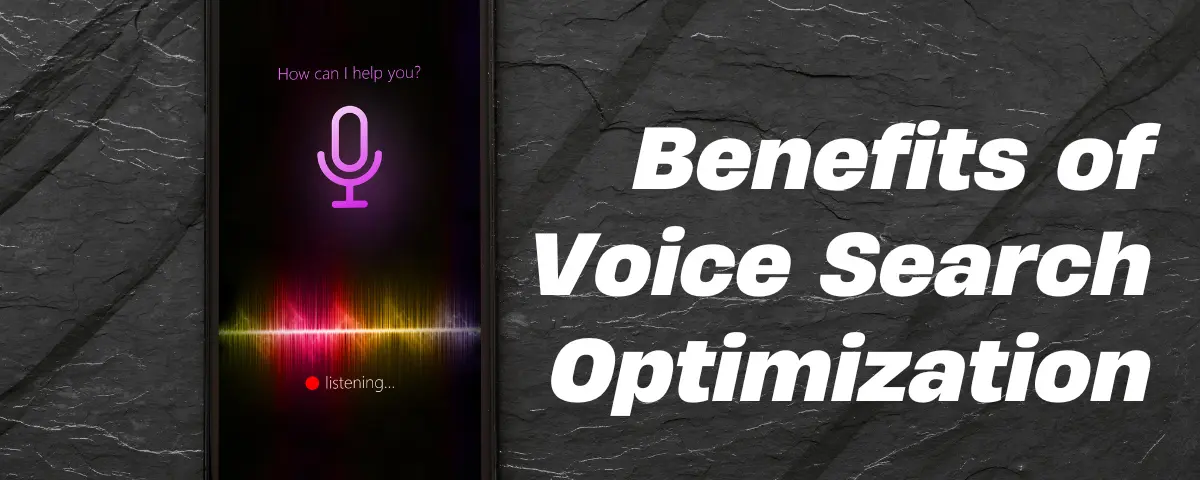Voice Search Optimization is one trend that is gradually changing the world of digital marketing in 2024. Voice search is quickly changing the game of search engine optimization. The days of typing keywords into search bars are gone while the rise of voice-activated assistants like Siri, Alexa, and Google Assistant has ushered in a new era of conversational search.
In addition, 27% of global mobile searches are now conducted by voice, so it is it’s no longer a question of if you should optimize your site for voice search, but how.
Therefore, this post explores 10 effective strategies to empower you to position your website at the forefront of voice-driven SEO.
What is Voice Search Optimization?
Voice Search Optimization is a new thread that has emerged in the search engine optimization (SEO) world. Voice Search Optimization is the strategic optimization of your website to rank higher in voice search results. It involves tailoring your website content and structure to cater to the unique characteristics of voice searches.
Unlike typed queries, which tend to be concise and keyword-focused, voice searches are more conversational and natural language-driven. Users typically ask questions and employ longer and more specific phrases.
Therefore, optimizing for Voice Search Optimization involves understanding these and adapting your website content accordingly to meet the search queries.
How Voice Search Works
Before we talk about Voice Search Optimization strategies, let’s understand the inner workings of voice search. This technology uses four fundamental processes:
Automatic Speech Recognition (ASR)
Get 50% Discount to Master ALL Aspects of Digital Marketing That Can Earn You $2,500 - $5,000 a month (Even if you are a complete beginner!)
Our students that intentionally implement what they learn from our digital marketing course make back the entire course fee within a single month or more after completing our course because our course gives them many income generating options with unlimited earning potential with no age or location barrier. The best part is no technical skills are required.
An opportunity to change your lifestyle and make money working from anywhere in the world. The results our students get from our digital marketing course prove this could be applied to any market or country and that it is designed for any skill level and work background.
*By signing up, you agree to our privacy policy and terms of service.
Voice search begins with Automatic Speech Recognition (ASR) engines which use machine learning. These engines, fueled by machine learning, translate spoken words into digital text, forming the foundation of your search query.
Imagine your voice as a complex sound wave. ASR technology transforms this wave into understandable text, interpreting individual words and accounting for accents and background noise.
Natural Language Processing (NLP)
Once converted to text, your query enters the realm of NLP. This sophisticated AI technology analyzes the text, understanding the context, intent, and meaning behind your query. See it as a digital translator, interpreting the “why” behind the “what.”
Therefore, NLP analyzes the meaning and intent behind your words. It understands not just the individual components but also the broader context.
Search and Retrieval
With your intent clear, the search engine delves into its vast index, matching your query to the most relevant websites and information. The system leverages search algorithms to check the vast digital landscape.
Accordingly, these algorithms, similar to their text-based counterparts, consider factors like relevance, authority, and user experience, search history, and website optimization to rank potential results.
Voice Synthesis
Finally, the chosen result is transformed back into human-intelligible speech through text-to-speech (TTS) technology. This “voice” delivers the information you seek, completing the remarkable cycle of voice search.
Therefore, understanding these core processes empowers you to optimize your website for the unique differences of voice search. By tailoring your content and structure to align with how users speak their queries, you can unlock the powerful potential of voice search.
If you want to learn how to optimize your website content for voice search, click here to learn how we can help you achieve that.
The Importance of Voice Search Optimization for SEO
If a brand, business, or website owner does not optimize their website for voice queries, they will lose the opportunity to expand their reach, enhance user experience, and solidify their online presence.
Therefore, brands should take advantage of optimizing their website for voice search when it comes to providing value to searchers online.
Some of the importance of optimizing your website for search include
Reach a Broader Audience:
The voice search revolution has unlocked a vast new user base. So when you optimize your website for conversational queries, you tap into this previously inaccessible audience, expanding your reach and potential customer pool.
Elevate User Experience
Voice search prioritizes natural language and convenience. Aligning your content and structure with this conversational style will help you enhance the user experience, making it easier and more intuitive for users to find what they need.
Local SEO Advantage
A significant portion of voice searches are location-based so make sure you incorporate local keywords and structured data properly. This will position your website as the go-to resource for local users, boosting your visibility and driving traffic to your online store or platform.
Future-Proofing Your Strategy
Voice search is the future of information access. Brands should embrace Voice Search Optimization today to ensure your website remains relevant and competitive as this technology continues to grow and evolve.
Boost Mobile Engagement
Voice search and mobile devices work well together. So when you optimize your website for Voice Search, it ensures you have the user in mind and your site is easily accessible. Your site must be user-friendly on smartphones and other voice-enabled devices.
Benefits of Voice Search Optimization
Optimizing your website is an investment that has tangible benefits for your SEO strategy and overall online presence.
Let’s explore the advantages of using Voice Search Optimization:
Improved Local SEO
Voice search is a powerful tool for local businesses. By optimizing for local keywords and Voice Search Optimization, you dominate local search results and attract customers within your vicinity.
Increased Website Traffic
By optimizing for voice search, you amplify your visibility in a rapidly expanding user base, leading to a surge in organic website traffic. This translates to more potential customers discovering your brand and exploring your offerings.
Competitive Edge
As Voice Search Optimization adoption increases, standing out from the crowd becomes crucial. When brand embraces Voice Search Optimization early, you gains a competitive advantage, attracting valuable voice search traffic and establishing yourself as a leader in your industry.
Enhanced Brand Awareness
With your website appearing prominently in voice search results, you gain valuable exposure and brand recognition. This fosters a stronger brand presence in the digital landscape, making you top of mind with potential customers.
Higher Conversion Rates
Voice search users possess strong purchase intent. By providing relevant and optimized content, you cater to their immediate needs, increasing the likelihood of conversions and sales.
Valuable User Insights
Voice Search Optimization provides a unique window into user behavior. Analyzing voice search queries allows you to understand user intent, preferences, and pain points in a more natural way. This will enable you to optimize your content and offerings for improved user experience and engagement.
10 Strategies to Optimize Your Website for Voice Search
Now that you know what voice search optimization means, its importance, and its benefits, how can you apply the information to optimize your website for voice search?
Therefore, here are 10 actionable strategies to use:
#1. Research Conversational Keywords
Researching keywords for voice search is a crucial step in optimizing your website for voice search. Unlike traditional text-based searches, voice searches tend to be more conversational and longer in nature.
Therefore, it’s important to identify and incorporate long-tail keywords and conversational phrases that align with how people speak.
#2. Craft Conversational Content
Crafting conversational content is a key aspect of optimizing your website for voice search. Given that voice searches tend to be more conversational and longer in nature, it’s important to write in a clear, concise, and engaging manner, using natural language and sentence structure.
To craft conversational content, follow these best practices:
- Use natural language: Write in a way that sounds like you’re speaking to a friend or a person who needs help. Avoid using jargon, technical terms, or overly complex sentences.
- Keep it simple: Break down complex topics into smaller, more manageable chunks. Use bullet points, numbered lists, and subheadings to make your content easier to read and understand.
- Be specific: Address the user’s needs and provide clear, actionable answers to their questions. Avoid vague or general statements and provide specific, detailed information.
- Use a conversational tone: Write in a friendly, approachable, and empathetic tone. Use phrases like “you,” “we,” and “let’s” to create a sense of connection with the reader.
- Keep it short: Voice search results tend to be shorter than traditional text-based search results. Focus on providing concise, to-the-point answers to the user’s questions.
By following these best practices, you can create content that is more engaging, accessible, and relevant to voice search users, ultimately improving your website’s visibility and accessibility in voice search.
#3. Leverage FAQs and Q&A Sections
When your FAQs address common user questions and concerns, you can be sure you are providing valuable information to your audience and improving their overall experience on your website. To optimize these sections for voice search, you have to answer the question your users are searching for on your website.
One of the ways to do that is by incorporating relevant keywords in some parts of your content when creating it. Lastly, keep it short and structure your content in a question-and-answer format.
#4. Optimize Local SEO
Optimizing local SEO is essential for voice search. When you are creating your online profile, make sure you include accurate information. Target local keywords and encourage positive customer reviews to improve your local search rankings and attract more customers.
When you set it up properly, search engines will understand your site and present your local business information to user when they search online for content that relate to your brand.
#5. Prioritize Mobile Optimization:
To optimize your website for voice search, you have to prioritize mobile optimization. Mobile devices are the primary platform for voice searches, and a lot of users are using mobile to search for information online. A well-optimized mobile website ensures a seamless user experience when they come to your website.
Mobile optimization includes:
- Fast page speed and responsive design
- Clear navigation and easy-to-read content
- Use of conversational language and long-tail keywords
- Incorporation of FAQs and Q&A sections
- Use of structured data markup
When focusing on mobile optimization, you can improve your website’s visibility and accessibility in voice search results.
#6. Focus on Page Speed:
A website’s loading speed plays a pivotal role in delivering a positive user experience, particularly in the realm of voice search where users expect immediate results. To ensure your small business’s website is optimized for speed, consider the following strategies:
- Image Compression: High-quality images are essential for enhancing the visual appeal of your website, but they can also significantly increase page load times. Make sure you compress images without compromising their quality, you can reduce their file size and improve page speed.
- Caching: Caching is a technique that stores frequently accessed data in a temporary storage location, allowing for faster retrieval and display of web pages. Implementing caching can significantly reduce page load times and improve user experience.
A fast-loading website is a critical component of your small business marketing strategy, and it’s essential to prioritize page speed optimization to stay competitive in today’s digital marketplace.
#7. Engage in Content Marketing
You need to create high-quality, informative content that addresses user needs and interests with your content. Some of the best ways to do that is by publishing blog posts, and articles that are relevant to what the user is searching for.
Also, make sure you consider users who are using voice search when using the internet. you can also optimize your videos for voice search by incorporating relevant keywords and natural language.
#8 Targeting featured snippets
Targeting featured snippets is a powerful strategy to optimize your website for voice search. Featured snippets are the highlighted search results that appear at the top of Google’s search results page, providing users with quick and concise answers to their queries.
When you answer queries that relate to what your users are searching for properly, you will have a better chance of appearing at the top for the target featured snippets. This can improve your website’s visibility and accessibility in voice search results, ultimately reaching and engaging a broader audience.
#9. Structured Data Markup
Structured data markup is a powerful tool when optimizing your website for voice search. It helps search engines better understand and present your content, making it easier for users to find the information they need.
It also provides search engines with additional information about your content, such as its type, structure, and relevance, and also provides information about the title, description, and author.
By using structured data markup, you can improve your website’s visibility and accessibility in voice search results, ultimately reaching and engaging a broader audience.
#10. Track and Analyze Results:
You need to monitor your voice search performance using analytics tools. Track metrics like impressions, clicks, and voice search ranking to identify areas for improvement and refine your Voice Search Optimization strategy.
As a result, when you implement these strategies, you will propel your website to new heights and reap the rewards of enhanced SEO, increased visibility, and deeper audience engagement.
If you want to learn how to optimize your content for voice search using seo , why not attend our next digital marketing training to start to understand the fundamentals of online marketing?
How Do People Perform Voice Searches?
To create an effective voice search optimization strategy, you need to understand how users interact with voice search.
Let’s explore the typical user journey:
Triggers and Devices
Voice searches are often initiated on voice-enabled smartphones, tablets, and devices which has voice assistants like Siri, Alexa, and Google Assistant. These applications offer convenience or accessibility for the user. Users can send voice commands to these devices as they cook or drive, which gives them the opportunity to multitask.
Conversational Queries
Voice queries are phrased as natural questions or statements. Users might ask, “Where is the best digital marketing training center near me?” or “How do I make Ghanaian Jollof Rice.?” These are the types of queries you should have in the content you are putting out there.
Long-Tail Keywords
Voice queries often contain longer and more specific keywords, which reflects the conversational nature. This presents an opportunity to optimize your content for long-tail keywords relevant to your target audience.
Localization
Users often seek information about nearby businesses, services, or amenities. Optimizing for local SEO and incorporating location-specific keywords is crucial for local businesses.
Multifaceted Answers
Voice assistants often provide multifaceted answers that summarize relevant information from various sources. Structuring your content with clear headings, subheadings, and concise summaries enhances its discoverability for voice search.
Follow-up Questions
Users might engage in follow-up questions to refine their search. Anticipating these potential follow-up questions and incorporating relevant information into your content can further improve user satisfaction and engagement.
Key Metrics to Track Voice Search Optimization Performance
Some key metrics need to be tracked to ensure your voice search optimization efforts yield results. This data-driven approach allows you to evaluate the effectiveness of your Voice Search Optimization strategy and identify areas for improvement.
Therefore, let’s explore the essential indicators that reveal the effectiveness of your voice search strategy:
Voice Search Impressions
This metric indicates the number of times your website appears in voice search results, regardless of whether users clicked through. Monitoring this metric helps you understand your visibility in the vocal web and identify potential ranking improvement opportunities.
Voice Search Clicks
This metric measures the number of users clicking on your website from voice search results. Analyzing trends in click-through rates (CTRs) can reveal how well your website resonates with voice search users and whether your content addresses their intent effectively.
Voice Search Conversions
This metric tracks the number of users who complete desired actions on your website after arriving through voice search. This could include purchases, sign-ups, or other conversions aligned with your business goals. Monitoring conversion rates helps you assess the direct business impact of your VSO strategy.
User Engagement Metrics
In addition to conversions, you need to consider user engagement metrics like average session duration, bounce rate, and page views. Analyzing these metrics provides insights into how users interact with your website after arriving through voice search, helping you refine your content and user experience for optimal engagement.
Voice Search Ranking
Though specific ranking data for voice searches are not available, you can track your ranking for relevant long-tail keywords used in voice queries. This indirect approach provides valuable insights into your relative visibility in voice search results and helps you identify areas for keyword optimization.
Local Search Performance
For local businesses, monitoring local voice search specific metrics is crucial. You need to track metrics like impressions, clicks, and conversions for local searches to assess the effectiveness of your local SEO and Voice Search Optimization efforts combined.
Brand Mentions
With this metric, you track the number of times your brand name is mentioned in voice search queries, even if not directly related to your website. This provides insights into brand awareness and potential areas for expanding your reach within the vocal web.
Conclusion
Finally, the vocal web is no longer in the future, it’s a present reality. Voice search optimization (VSO) is no longer a luxury; it’s a necessity for every website on the web. As a website owner, if you use these 10 powerful strategies and diligently track your performance, you can unlock the potential of voice search and propel your website to new heights.
Remember, Voice Search Optimization is not a one-time effort; it’s an ongoing journey. You should endeavor to stay informed about evolving trends, experiment with new tactics, and prioritize user experience.
Therefore, by engaging with the vocal web, you can connect with your audience on a deeper level, amplify your brand voice, and achieve remarkable results in the ever-evolving digital landscape.
All you need to do is acquire and hone relevant digital marketing skills by enrolling in some or all of the courses listed below.
FAQs
How Do I Optimize Google Voice?
Google Voice is a cloud-based phone service that provides a variety of features to help you manage your calls, messages, and voicemail.
To optimize Google Voice, you can use it as your primary phone number, set up the call forwarding feature, use the spam and voice screening feature. This will enable you to get the most of the service.
How does Voice Search affect SEO?
Your SEO strategy needs to include voice search optimization. This means you include how users verbally search for information online, that is the conversational long-tailed keywords they use and the answers to those queries.
How Do I Get Listed on Voice Search?
There is no registration or a single way to get your business or website listed for voice search. However, ensuring your business is accurately listed on Google Business Profile with all the necessary information is a good starting point.
Secondly, consider listing your business in known sources for voice assistants like Siri, Alexa, and Google Assistant to ensure that when queries related to your business are asked, they can pull information from your website and offer it to the searcher.
More Contents
What is SEO in Digital Marketing and How it Works.
9 Easy Website SEO Tips To Rank Higher On Search Engine







